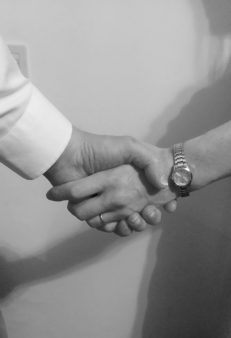The Benefits of Disagreement
17 June 2019
Our world contains a whirlwind of claims and opinions, including about important matters like politics, ethics, and religion. In forming our own view, it is natural to find our way by taking the opinions of our friends, social media circles, and political and religious compatriots more seriously than outsiders’. After all, they share our values and priorities.
But it is also commonplace to actively downgrade outsiders’ viewpoints, just because they come from outsiders. Instead of trusting that others must have good reasons for their views (even if we ultimately disagree), we tend to dismiss them because they are reasoning from their values and priorities, not ours.
But if this attitude of distrust defines how we form our views, we risk becoming one-dimensional thinkers. It siphons away our ability to see the world as it is, in shades of gray. Our own view – incomplete at the best of times – becomes oversimplified, so that we miss out on knowing and understanding important things.
To see this, note how complex the world is. Our minds deal with this complexity by crunching information into neat categories. Where do these categories come from? Not from our conscious reasoning, for such categories must be in place already for us to reason at all. Rather, they develop implicitly or unconsciously, from our experiences, our psychology, and the society we keep. And because we think through our categories, we can’t easily become aware of how they structure our thought, just as it is hard to see our glasses while we are wearing them.
This leads to several worries about our thinking. First, distortions might creep in. On the one hand, many of the social and psychological influences on our beliefs help us know the world as it is; for example, we associate eye contact with honesty, and often people who make eye contact are sincere. On the other hand, these influences can mislead us; for example, practiced liars make excellent eye contact. And many influences disguise the truth: we are biased, for example, toward thinking that any status quo is just, even if it is not.
Second, if distortions do creep in, we lack the tools to become aware of them. We cannot easily evaluate our own viewpoints or the reasons for them, because a big part of how we form them is less than conscious. We’ll think our minds did a passable job, not necessarily because they did, but because we are ill-equipped to tell if they didn’t.
A third worry arises specifically when we think about important topics like ethics, public policy, and religion: The first two worries are exacerbated. Our viewpoints are more likely to be subject to distortion, and we become worse at critically evaluating them. Why? Because these matters can be emotional, with much at stake for us. This activates our defense mechanisms, priming us to seek safety in a coherent and simple picture, even if that picture gets things wrong.
These three worries arise from the way our minds are built, so they are not our fault. But if we want to learn to see the world more as it is, in shades of gray, we need to counteract them (and if we get something important wrong because we don’t bother trying to counteract them, then we are at fault).
One thing that we can do is engage with the views of those who disagree with us: hear others out and try to understand them in their own categories, not ours.
This recommendation might come as a surprise if others’ values and priorities differ significantly from ours, for this indicates (to us) that they are on the wrong track. How can engaging in disagreement with people who are on the wrong track help us? The answer is that if anyone can locate distortions in our viewpoint, it will be those who don’t share it. If anyone can call our implicit categories to the foreground, it is those who use radically different ones. And we are in a position to perform the same service for them.
There are several ways in which engaging with someone we disagree with can help us see the world more accurately, in shades of gray:
First, a disagreeing outsider can provide a less sympathetic evaluation of our belief system, to counterbalance our usually favorable self-evaluations.
Second, such a person can give us more evidence to draw on than we would otherwise have, for we learn their evidence for their view. And their evidence will arise from different experiences than ours, and will be filtered through different mental categories than ours.
Third, in engaging in disagreement we see different categories up-close in action. By trying, and perhaps failing, to map our categories onto our conversation partner’s, we might become more conscious of our categories. And if we do manage to get the hang of their categories to some extent, we may even find them more suited than our own to understanding certain things.
So engaging in disagreement can counteract the forces that pull us toward oversimplifying inaccuracy. Yet we cut ourselves off from disagreement when we dismiss those outside of our group on account of their different priorities and values. Even if our priorities and values are right, they will stagnate unless stirred and challenged.
Of course, it is one thing to say that we should engage in disagreement if we want to see the world more accurately, and another to say how. After all, our third worry shows us that disagreement itself sharpens the oversimplifying tendencies. Our viewpoint helps us navigate the world, and exposing it to challenge is scary.
So beside the recommendation to engage in disagreement, we need another, human, ingredient that can catalyze fruitful discussion rather than push each party further into their own opposing and simplified worldview corners. What that human ingredient is, and how it works, will be the topic of my next post.
Picture: Handshake by Katherine Dormandy
Comments
- July 2024
- June 2024
- May 2024
- April 2024
- March 2024
- February 2024
- January 2024
- December 2023
- November 2023
- October 2023
- September 2023
- August 2023
- July 2023
- June 2023
- May 2023
- April 2023
- March 2023
- February 2023
- January 2023
- December 2022
- November 2022
- October 2022
- September 2022
- August 2022
- July 2022
- June 2022
- May 2022
- April 2022
- March 2022
- February 2022
- January 2022
- December 2021
- November 2021
- October 2021
- September 2021
- August 2021
- July 2021
- June 2021
- May 2021
- April 2021
- March 2021
- February 2021
- January 2021
- December 2020
- November 2020
- October 2020
- September 2020
- August 2020
- July 2020
- June 2020
- May 2020
- April 2020
- March 2020
- February 2020
- January 2020
- December 2019
- November 2019
- October 2019
- September 2019
- August 2019
- July 2019
- June 2019
- May 2019
- April 2019
- March 2019
- February 2019
- January 2019
- December 2018
- November 2018
- October 2018
- September 2018
- August 2018
- July 2018
- June 2018
- May 2018
- April 2018
- March 2018
- February 2018
- January 2018
- December 2017
- November 2017
- October 2017
- September 2017
- August 2017
- July 2017
- June 2017
- May 2017


1 comment
Comments are closed.